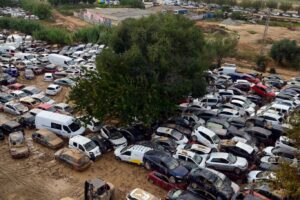It wasn’t the usual end to a day out walking in the countryside.
On Thursday, journalist Riham Alkousaa was on a hiking holiday, walking with a group through the mountainous wooded region of Saxon Switzerland, in the eastern German state of Saxony.
But when she got back to her hostel, she found that police officers were waiting for them.
Someone had called the police, saying that “a group of foreigners” had been spotted.
The caller reported them as migrants who were supposedly trying to cross the border from nearby Czechia illegally.
But Ms Alkousaa was out walking with a registered German hiking club whose members are mostly Syrians living in Germany.
She is an award-winning journalist who works for Reuters. Originally from Syria, she is a German citizen, who graduated from Columbia University in New York. For the past 10 years she has worked for many German and American publications.
The Syrians she was hiking with all work or study in Germany legally.
Saxony police told the BBC that a German citizen contacted regional police on Germany’s emergency number 110, having spotted the hiking group near the border, and suspecting that the group might be being smuggled across the border.
Regional police then passed on the information to the federal police force who sent officers to the region to patrol, where they found the hikers.
Having checked the hiking group’s documents which proved the whole group was in Germany legally, police said they ended the operation.
Ms Alkousaa’s post about the incident on X, formerly known as Twitter, has provoked a storm of reaction on social media.
Police said Ms Alkousaa had not contacted them directly and no complaint has been lodged.
Many of the reactions to the post express support for her, but some of the comments are racist. Others approve of the police’s response.
The incident points to growing concerns in Germany about whether minorities are welcome in areas where the anti-migrant far-right Alternative for Germany, or AfD, is surging.
Saxon Switzerland is one of Germany’s most beautiful regions. Its spectacular mountainous terrain is portrayed in the works of 18th and 19th century Romantic painters, such as Caspar David Friedrich. The landscape has a special place in German culture and is popular with tourists.
But the state of Saxony is also a place where the far-right does well in elections.
In polls the AfD is either the most popular party, with around a third of the votes, or neck-and-neck with the incumbent conservative Christian Democratic Union (CDU).
Next year three German regions, including Saxony, will elect new regional parliaments. At the moment it’s unlikely that the AfD will get into power because no other party will form a coalition with it.
But if the far-right wins the most votes, it could make it impossible for mainstream parties to form a stable governing coalition.
Over the past few months Germany has been embroiled in a ferocious debate about rising numbers of asylum seekers. So far this year around 290,000 people have applied for asylum, which is more than in 2022.
The numbers are much lower than in 2015 and 2016, when 1.5 million migrants and refugees came to Germany.
But some local councils are struggling logistically because the current influx comes on top of large numbers of Ukrainians. Germany has taken in 1.5 million Ukrainians since Russia’s full invasion last year.
The increasingly fractious mood over migration is a boon for the AfD, which is fiercely anti-migrant.
Over the past decade its rhetoric has morphed from anti-euro populism to nativist far-right radicalism. Nationally the AfD typically polls over 20%, second only to the opposition conservatives.
Conservative politicians have also been adding pressure on the government. Angela Merkel’s centrist so-called Willkommenskultur, or welcome culture, appears to have vanished from the debate. The new conservative leader Friedrich Merz is more hard-line with his rhetoric and is pushing the government to toughen up borders.
As a result, chancellor Olaf Scholz’s left-leaning coalition has introduced spot checks on eastern borders with Poland and Czechia, where some migrants cross into Germany.
Officials say the aim is to target people smugglers. But critics suspect that when they are faced with the rise of the AfD, the move is more about cosmetic political action in the run-up to key elections across eastern Germany next year.
As Germany struggles with labour shortages in many sectors, local business leaders regularly express concern that the rise of the AfD may be harming eastern Germany’s economic prospects.
They fear that potential workers from abroad might be reluctant to work in regions where the far-right is popular. Judging from reactions to Riham Alkousaa’s experience, some international tourists may be put off too.
Source : BBC









